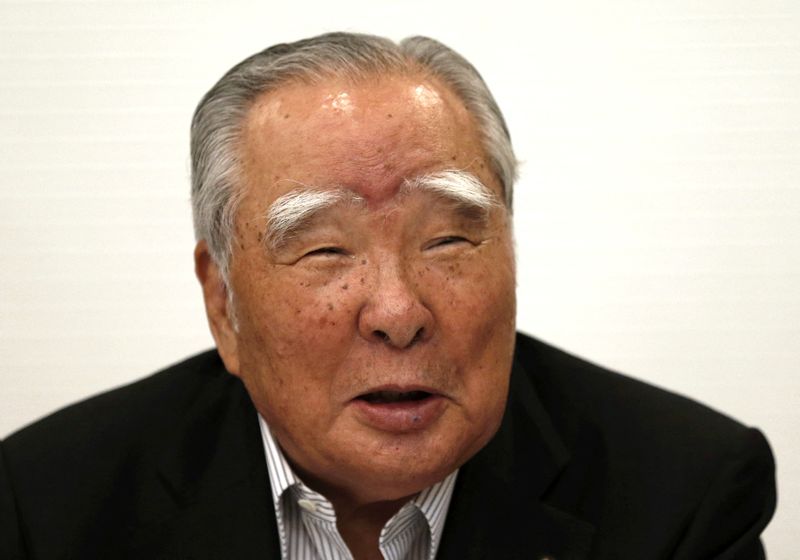By Chang-Ran Kim
TOKYO (Reuters) -Osamu Suzuki, an ingenious pennypincher who led Japan's Suzuki Motor for more than four decades and played a key role in turning India into a flourishing auto market, has died aged 94.
He died on Christmas Day of lymphoma, said the company, which he steered ambitiously, during his time as either chief executive or chairman, out of its primary market of minivehicles.
The inexpensive, boxy, 660-cc cars specific to Japan benefited from generous tax breaks, but demanded a stringent reining-in of costs that proved to be a key part of the automaker's DNA.
Even so, Suzuki's thriftiness was legendary: he would order factory ceilings lowered to save on air-conditioning and fly economy class on airplanes even at an advanced age.
"Forever," or "until the day I die," were signature humorous responses with which he parried queries about how long he would stay at the company, on which he retained a tight grip into his 70s and 80s.
Born Osamu Matsuda, Suzuki took his wife's family name through adoption in a practice common among Japanese families lacking a male heir.
The former banker joined the company founded by her grandfather in 1958 and worked upwards through the ranks to become president two decades later.
In the 1970s, he saved the company from the brink of collapse by convincing Toyota Motor (NYSE:TM) to supply engines that met new emissions regulations, but which Suzuki Motor had yet to develop.
More success followed with the 1979 launch of the Alto minivehicle, which became a massive hit, boosting the automaker's bargaining power when it tied up with General Motors (NYSE:GM) in 1981.
INDIA
Suzuki then took a big and risky decision to invest a year's worth of the company's earnings to build a national car maker for India.
His personal interest was motivated by a strong desire "to be number one somewhere in the world", he would later recall.
At the time, India was an automotive backwater with annual car sales below 40,000, mainly British knock-offs.
The government had just nationalised Maruti, set up in 1971 as a pet project of Sanjay Gandhi, son of then-Prime Minister Indira Gandhi, to produce an affordable, "people's car" made in India.
Maruti needed a foreign partner but early collaboration with Renault (EPA:RENA) fell through as the sedan being considered was deemed too expensive and insufficiently fuel-efficient for domestic needs.
The Maruti team knocked on many doors but was snubbed widely by brands including Fiat (BIT:STLAM) and Subaru (OTC:FUJHY) and - by accident - Suzuki Motor.
The partnership only came about after a Suzuki Motor director in India saw a newspaper article about a potential Maruti deal with Japanese small-car rival Daihatsu.
He telephoned headquarters to learn that the Maruti team had been turned away. Suzuki then telexed Maruti and hastily invited the team back to Japan, asking for a second chance.
A letter of intent was signed within months.
The first car, the Maruti 800 hatchback based on the Alto, was launched in 1983, becoming an instant success.
Today, Maruti Suzuki, majority-held by Suzuki Motor, still commands roughly 40% of India's car market.
In class-conscious India, Suzuki also ushered in change, insisting on equality in the workplace, ordering open-plan offices, a single canteen and uniforms for executives and assembly-line workers alike.
Not all endeavours were a success, however.
A month shy of his 80th birthday, Suzuki clinched a multi-billion-dollar tie-up with giant Volkswagen (ETR:VOWG_p) in December 2009.
Touted as a match made in heaven, it soon faltered, with Suzuki Motor accusing its new top shareholder of trying to control it, while VW objected to the Japanese firm's purchase of diesel engines from Fiat.
Suzuki Motor took VW to an international arbitration court in less than two years, eventually succeeding in buying back the stake of 19.9% it had sold to the German automaker.
Suzuki, who often cited golf and work as the keys to his health, finally passed the baton as CEO to his son Toshihiro in 2016, and stayed on as chairman for another five years until age 91, keeping an advisory role until the end.
Since 2016, his company has deepened ties with the world's biggest carmaker Toyota, which acquired a 5% stake in Suzuki Motor in 2019. Maruti Suzuki is set to supply electric cars for Toyota from next year.

"To me, he was more than an admired business leader: he was like a father," Toyota chairman Akio Toyoda said in a Friday statement, honouring Suzuki as a trailblazer of minivehicles.
"He was a father figure who developed Japan's kei car (minivehicle) and nurtured it into Japan's people's car."